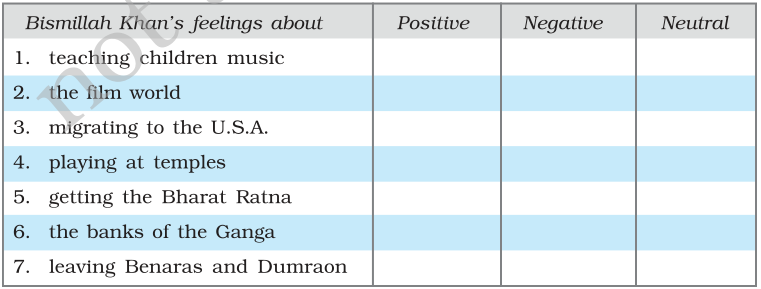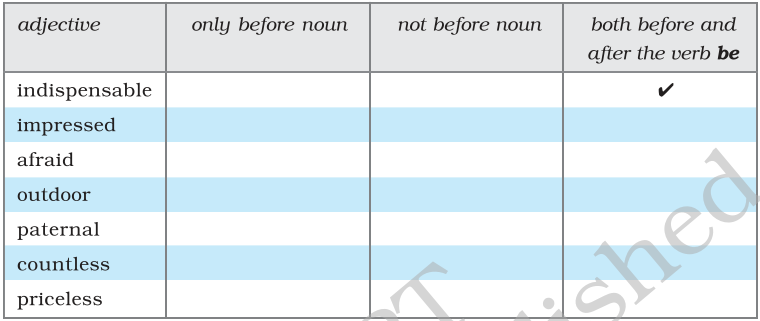NCERT Solutions for The Shehnai of Bismillah Khan (The Sound of Music) Class 9 Beehive English
Book SolutionsI
Tick the right answer.
1. The (shehnai, pungi) was a ‘reeded noisemaker.’
2. (Bismillah Khan, A barber, Ali Bux) transformed the pungi into a shehnai.
3. Bismillah Khan’s paternal ancestors were (barbers, professional musicians).
4. Bismillah Khan learnt to play the shehnai from (Ali Bux, Paigambar Bux, Ustad Faiyaaz Khan).
5. Bismillah Khan’s first trip abroad was to (Afghanistan, U.S.A., Canada).
Answer
1. The pungi was a ‘reeded noisemaker.’2. A barber transformed the pungi into a shehnai.
3. Bismillah Khan’s paternal ancestors were professional musicians.
4. Bismillah Khan learnt to play the shehnai from Ali Bux.
5. Bismillah Khan’s first trip abroad was to Afghanistan.
II

Answer

III.1
Answer
Aurangzeb banned the playing of musical instrument pungi because it had a shrill, unpleasant sound.III.2
Answer
Shehnai has a better tonal quality than pungi. It is a natural hollow stem pipe with holes on its body and is longer and broader than the pungi. Shehnai is, in a way, an improvement upon the pungi.III.3
Answer
The shehnai was traditionally played in royal courts, temples and weddings. Ustaad Bismillah khan, an undisputed monarch of shehnai brought this instrument onto the classical stage.III.4
Answer
Bismillah khan got his big break in 1938. The All India Radio opened in Lucknow and Bismillah khan played shehnai on radio. He soon became an often heard player on radio. He became the first Indian to greet the nation with his shehnai from the Red Fort on 15 August, 1947.5
Answer
On 15 August 1947, Bismillah Khan played the Raag Kaafi on his shehnai from the Red Fort. The event was historical because it was on the occasion of India's Independence from British Rule.6
Answer
Bismillah Khan refused one of his student's request to start a shehnai school in the U.S.A. because he would not live away from Hindustan, specifically, from Benaras, the River Ganga and Dumraon.III.7
Answer
The first instance is when he turned down his student’s offer to start a shehnai school in U.S.A. The second instance is when Khansaab was asked by Shekhar Gupta about moving to Pakistan during the partition, he said that he would never leave Benaras.I
Complete the following sentences. Beginning with a to-verb, try to answer the questions in brackets.
1. The school sports team hopes (What does it hope to do ?)
2. We all want (What do we all want to do ?)
3. They advised the hearing-impaired child’s mother (What did they advise her to do ?)
4. The authorities permitted us to (What did the authorities permit us to do ?)
5. A musician decided to (What did the musician decide to do ?)
Answer
1. The school sports team hopes to win the match.2. We all want to go to succeed in our life.
3. They advised the hearing-impaired child’s mother to consult a doctor.
4. The authorities permitted us to construct the building.
5. A musician decided to open a school for children.
II
From the text on Bismillah Khan, find the words and phrases that match these definitions and write them down. The number of the paragraph where you will find the words/phrases has been given for you in brackets.
1. the home of royal people (1) ________
2. the state of being alone (5) _________
3. a part which is absolutely necessary (2)_______
4. to do something not done before (5) _______
5. without much effort (13) ______
6. quickly and in large quantities (9) _______ and _______
Answer
1. The royal residence2. Solitude
3. Indispensable
4. Invent
5. Effortlessly
6. Thick and Fast
III
Tick the right answer.
1. When something is revived, it (remains dead/lives again).
2. When a government bans something, it wants it (stopped/started).
3. When something is considered auspicious, (welcome it/avoid it).
4. When we take to something, we find it (boring/interesting).
5. When you appreciate something, you (find it good and useful/find it of no use).
6. When you replicate something, you do it (for the first time/for the second time).
7. When we come to terms with something, it is (still upsetting/no longer upsetting).
Answer
1. When something is revived, it lives again.IV

Answer
